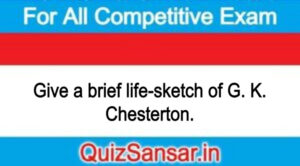
Give a brief life-sketch of G. K. Chesterton.
Give a brief life-sketch of G. K. Chesterton.
Ans.
Birth and Parentage
Gilbert Keith Chesterton was born in Champden Hill in Kensington, London in a middle class family in 1874. Edward, his father, whom Chesterton described a ‘sincere, humorous and full of hobbies’, was a member of the well-known Kensington auctioneer and estate agents business of Chesterton. Marie Louise, his mother, was of Franco-Scottish ancestry. Chesterton did not learn to read until he was over eight, but later he could quote passages of books from memory. One of his teachers told him. “If we opened your head, we should not find brain but only a lump of white fat.”
His Education and Journalistic Work
Chesterton attends the Slade School of Art in order to become an illustrator and also took literature classes at University College London but did not complete a degree at either. Around 1893, Chesterton had gone through a crisis of skepticism and depression. During this period he experimented with the Ouija board and grew fascinated with diabolism. In 1895, Chesterton left University College without a degree and worked for a London publisher Redway, and T. Fisher Unwin (1896-1902). Much of his early writings were first published in such publications as The Speaker, Daily News, Illustrated London News, Eye Witness, New Witness, and in his own G. K. ‘s Weekly.
His Marriage and Other Works
Chesterton renewed his Christian faith; also the courtship of his future wife, Frances Bloggy, whom he married in 1901, pulled him out of the crisis. Greybeards at Play. Chesterton’s first collection of poems, appeared in 1900. Robert Browning (1903) and Charles Dickens (1906) were literary biographies. The Napoleon of Nothing Hill (1904) was Chesterton’s first novel, a political fantasy, and in The Man Who Was Thursday (1908) Chesterton depicted fin-de-siecle decadence.
His Leading a Movement
In 1909, Chesterton moved with his wife to Beaconsfield, a village twenty five miles West of London, and continued to write, lecture and travel energetically. Between 1913 and 1914 Chesterton was regular contributor for the Daily Herald. In 1914, he suffered a physical and nervous breakdown. After World War I Chesterton became leader of the Distributist Movement and later the President of the Distributist League, promoting the idea that private property should be divided into smallest possible freeholds and then distributed throughout society. In his writings… Chesterton also expressed his distrust of world government and evolutionary progress. During the Boer War he took a pro-Boer standpoint.
His Honour with Degrees and His Death
Chesterton received honorary degrees from Edinburgh, Dublin, and Nature Dame universities. In 1934 he was made Knight Commander with star, Order of St. Gregory the Great. Chesterton died on June 14, 1936, at his home in Beaconsfield. His coffin, too big to be carried down the staircase, had to be lowered from the window to the ground. Dorothy Collins, Chesterton’s secretary, managed his literary estate until her death in 1988.
-
Write the critical appreciation of the poem No. 12 entitled Far Below Flowed.
-
Write the critical appreciation of the poem No. 11 entitled Leave this Chanting.






